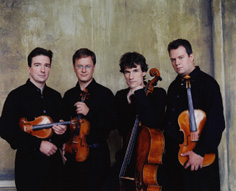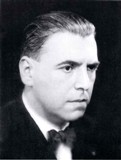
|
The Vogler Quartet of Berlin brought music
by Haydn, Schumann, Dvorak and Erwin Schulhoff to the season's second concert
by Chamber Music Cincinnati. Music is a
stream, and stylistic differences aside, all these works shared a romantic
thread, as noted so engagingly by CCM's Albert Mühlböck
in the program booklet.
Haydn was stepping up to the romantic period
in his 1794 Quartet in G Minor, Op. 74, No. 3 ("the Rider"). Twentieth-century Czech composer Erwin
Schulhoff was coming out of it in his 1924 String Quartet No. 1. Robert Schumann was smack in the middle of it
with his Quartet No. 3 in A Major, Op. 41, and Dvorak -- well, he was just in
love in his "Cypresses," a collection of quartets based on a song set
he wrote for his first (unrequited) love.
Founded in East Berlin in 1985, the Vogler
Quartet -- violinists Tim Vogler and Frank Reinecke, violist Stefan Fehlandt
and cellist Stephan Forck -- have a Cincinnati connection, having spent a
quarter at CCM in 1989 studying with the LaSalle Quartet. The influence shows in their advocacy of
contemporary music and the polish and perception they bring to it.
Without doubt, their performance of
Schulhoff's Quartet was the highpoint of the concert and a welcome reminder of
the great music we usually do not hear.
That's the way it was until recently for Schulhoff, whose Jewish blood
earned him death in a concentration camp in 1942 and oblivion for his
music. Along with other composers
"forbidden" by the Third Reich, he is enjoying belated attention, and
his String Quartet No. 1 is a stunning example of what we have been missing.

The Vogler grabbed their listeners by the
ears in the opening Presto con fuoco, a fire-and-ice, hoedown-like movement,
whose vigorous unison passages were interleaved with steely playing on the
bridge ("sul ponticello").
Violist Fehlandt enjoyed the spotlight often, as in the movement marked
"con malinconia grot" ("with grotesque melancholy") and
there was plenty of folkish color in the Allegro "giocoso alla
Slovacca" ("in playful Slovakian style").
The final Andante -- it is unusual for a
quartet to close with a slow movement -- had a tragic cast, with a kind of
mini-cadenza for violinist Vogler and long, woozy passages that led to a final,
forlorn fadeout.
Dvorak set 12 of his "Cypresses"
for string quartet. Heard were nos. 1,
2, 3, 11 and 7 with the lovelorn titles:
"I'm sure and hope sustains me," "In many hearts, 'tis
still as death," "Overcome by your powerful eyes," "Even
now the countryside lightly slumbers" and "Round your former
dwelling, there I stagger." The
quartet gave them an affectionate reading, by turns florid, serious, sweetly
reflective, even wryly witty.
Schumann was blissfully united with his wife
Clara when he wrote his String Quartet No. 3, and the Vogler's performance was
flush with feeling. You could almost
feel the composer's pulse in the first
movement, with its downward sighs and catchy syncopation, and his exuberance in
the second, a colorful theme-and-variations movement. The players produced a luscious sound in the
Adagio, from the simplest cello pizzicato -- Forck can make the smallest
gesture a work of art -- to the soft,
almost organ-like conclusion. The
joyous, dotted-rhythm finale had all the flair Schumann put into it, and the
Vogler's precision and ensemble clarity were superb to bring the concert to an
end.
Not to overlook Haydn, his "Rider"
quartet -- so named for its galloping final movement -- was given an
unabashedly romantic reading to open the concert. Violinist Vogler presided like a diva, and
the music overflowed with expression.
There was abundant warmth in the slow movement, and the giddyup finale
seemed to strain at the leash.
Chamber Music Cincinnati's next concert is
Jan. 12 at CCM with the contemporary music sextet eighth blackbird.